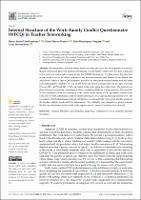| dc.contributor.author | Santa-Cruz-Espinoza, Henry | |
| dc.contributor.author | Chávez-Ventura, Gina | |
| dc.contributor.author | Domínguez-Vergara, Julio | |
| dc.contributor.author | Merino-Soto, César | |
| dc.date.accessioned | 2023-12-20T22:15:36Z | |
| dc.date.available | 2023-12-20T22:15:36Z | |
| dc.date.issued | 2023 | |
| dc.identifier.uri | https://hdl.handle.net/20.500.13067/2895 | |
| dc.description.abstract | The interference between family and work roles has led to the development of scales for their measurement. However, instrumental studies of work–family conflict have not been conducted in the context of teacher teleworking during the COVID-19 pandemic. For this reason, the objectives of this study were set to obtain evidence of the internal structure and fairness of the Blanch and Aluja Work–Family Conflict Questionnaire, as well as its association with job satisfaction and other sociodemographic variables. A total of 235 Peruvian school teachers between the ages of 24 and 72 years (M = 43.79 and SD = 9.67) responded to the scale using the online form. The analysis employed the non-parametric item response theory modeling (Mokken scaling analysis). The structure of two correlated factors was confirmed: work conflict in the family (WCF) and family conflict in the work (FCW). Both dimensions were invariant with respect to sex group and educational level. The association of both dimensions with job satisfaction was theoretically convergent, and the gender of the teachers slightly moderated this relationship. The reliability was adequate for group research. Finally, the instrument can be useful in the organizational context of teachers who telework. | es_PE |
| dc.format | application/pdf | es_PE |
| dc.language.iso | eng | es_PE |
| dc.publisher | MDPI | es_PE |
| dc.rights | info:eu-repo/semantics/openAccess | es_PE |
| dc.rights.uri | https://creativecommons.org/licenses/by/4.0/ | es_PE |
| dc.subject | Validity | es_PE |
| dc.subject | Reliability | es_PE |
| dc.subject | Psychometric properties | es_PE |
| dc.subject | Confirmatory factor analysis | es_PE |
| dc.subject | Factorial invariance | es_PE |
| dc.title | Internal Structure of the Work–Family Conflict Questionnaire (WFCQ) in Teacher Teleworking | es_PE |
| dc.type | info:eu-repo/semantics/article | es_PE |
| dc.identifier.journal | International Journal of Environmental Research and Public Health | es_PE |
| dc.identifier.doi | https://doi.org/10.3390/ijerph20020970 | |
| dc.subject.ocde | https://purl.org/pe-repo/ocde/ford#5.01.00 | es_PE |
| dc.relation.url | https://www.mdpi.com/1660-4601/20/2/970 | es_PE |
| dc.source.volume | 20 | es_PE |
| dc.source.issue | 2 | es_PE |
| dc.source.beginpage | 1 | es_PE |
| dc.source.endpage | 16 | es_PE |


